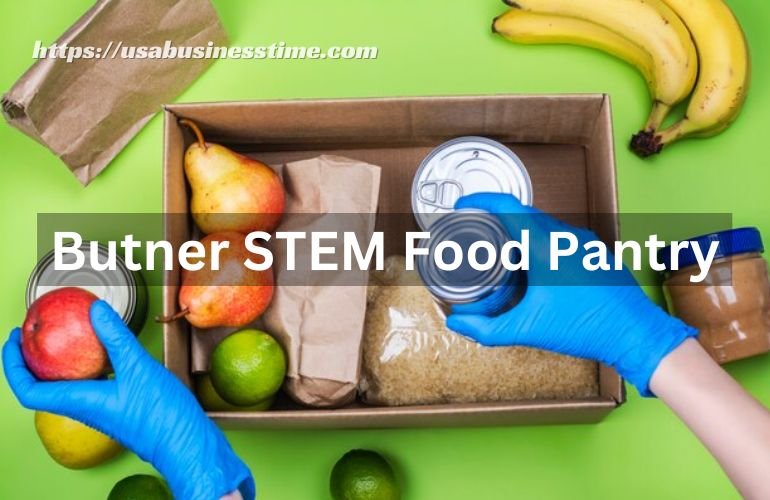In a community where food insecurity and hardship affect many, the Butner STEM Food Pantry stands as a vital support system. With a commitment to reducing hunger and providing resources, the pantry not only supplies essential food items but also serves as a center for resilience and hope. Each donation and volunteer effort helps bridge gaps, offering relief to those who need it most. The following sections reveal the inspiring mission, impactful services, and stories that shape the Butner STEM Food Pantry, highlighting how it continues to empower families and strengthen the community.
Table of Contents
History and Background
The Butner STEM Food Pantry was founded to address a growing need within the community. Recognizing the impact of food insecurity on local families, a group of concerned community members and educators joined forces to create a resource that would help alleviate hunger while fostering a spirit of support and togetherness. Their vision was simple: a pantry that not only meets basic needs but also empowers individuals by creating an inclusive and supportive environment.
Starting from humble beginnings, the pantry initially operated on a small scale, providing essential food supplies to a handful of families. Over time, with increased awareness and community involvement, it grew into a reliable source of aid for a much larger group. The pantry’s unique connection with the STEM education community set it apart. Through the involvement of students, educators, and volunteers with a passion for science, technology, engineering, and math, the pantry infused educational elements into its work. This foundation strengthened its identity, building a bridge between education and community service.
Today, the Butner STEM Food Pantry has become more than a food provider. Its history reflects the dedication and resilience of the community, evolving from a simple food pantry to a vital part of local life. By connecting food assistance with educational engagement, it not only addresses hunger but also inspires a community-driven approach to learning and support. This legacy of compassion and cooperation continues to guide its work, making it a key part of the neighborhood and a hopeful example for similar initiatives elsewhere.
Mission, Vision, and Purpose
The Butner STEM Food Pantry operates with a clear mission: to reduce food insecurity by providing accessible, nutritious food options to community members in need. Central to this mission is the belief that everyone deserves to have consistent access to food, a basic necessity that strengthens individuals, families, and ultimately, the community. This commitment extends beyond simple food distribution; the pantry aims to create an environment of dignity and respect, where each recipient feels valued and supported.

The pantry’s vision goes hand in hand with its mission. It envisions a community where hunger is rare, resources are shared, and neighbors support one another. By fostering a culture of kindness and understanding, the Butner STEM Food Pantry aspires to build a place where people can find assistance without stigma. The pantry also sees the connection between food security and broader wellbeing, recognizing that reliable access to food can lead to improved health, increased stability, and more opportunities for individuals to thrive.
In line with this purpose, the pantry emphasizes community engagement. Volunteers, donors, and local partners all play vital roles in fulfilling the pantry’s mission. By engaging the broader community, the pantry brings people together under a common cause, building bonds that transcend individual struggles. This collective spirit of service and unity helps fuel the pantry’s daily operations and long-term goals.
Ultimately, the Butner STEM Food Pantry exists not only to combat hunger but to serve as a beacon of hope, resilience, and community empowerment. With every meal provided and every connection made, the pantry brings its mission to life, working toward a future where hunger has no place and everyone can feel supported and uplifted.
Services and Programs
The Butner STEM Food Pantry offers a range of services designed to meet the needs of individuals and families facing food insecurity. At its core, the pantry provides essential food items, focusing on nutritious options that help promote health and wellbeing. This service is structured to offer a balanced selection of non-perishable goods, fresh produce when available, and other staples that are essential for a well-rounded diet. Regular distribution events ensure that those in need can access food consistently, helping to alleviate the stress of food scarcity.
Beyond food distribution, the pantry extends its impact through educational programs tied to STEM (Science, Technology, Engineering, and Math). These programs are woven into the pantry’s services, offering workshops and resources that emphasize healthy eating, meal planning, and nutritional education. Through these educational efforts, recipients gain valuable knowledge that can enhance their daily lives, encouraging healthier choices and a greater understanding of nutrition. This educational focus reflects the pantry’s belief in empowering the community not just by providing food but by sharing practical knowledge.
The pantry also prioritizes accessibility, aiming to serve people of all backgrounds, ages, and situations. For those with transportation challenges, the pantry coordinates with local partners to provide delivery options or mobile services. By removing logistical barriers, the pantry ensures that individuals facing different hardships can still receive support.
Volunteers play a central role in the pantry’s daily operations and programs. From assisting with food distribution to supporting educational workshops, volunteers bring energy, kindness, and a personal touch to each interaction. Their presence allows the pantry to operate effectively while fostering a welcoming environment where each person feels connected and valued.
Together, these services and programs reflect the Butner STEM Food Pantry’s holistic approach. The pantry isn’t just a place to find food; it’s a community resource dedicated to promoting wellness, building skills, and creating an inclusive space where everyone is supported in meaningful ways.
Community Impact
The Butner STEM Food Pantry has become a lifeline for many in the community, addressing both immediate needs and fostering long-term resilience. Its impact can be seen in the lives of families who now have a reliable source of nutritious food, reducing the strain of food insecurity. By providing access to essentials, the pantry helps individuals and families allocate their limited resources toward other pressing needs, such as housing, healthcare, and education. This support not only alleviates day-to-day hardships but also contributes to overall stability and wellbeing.
Through its outreach, the pantry has strengthened the bonds within the community. Neighbors come together to support each other, with local businesses, schools, and organizations collaborating to keep the pantry’s shelves stocked. This shared commitment fosters a sense of unity, turning what might feel like isolated struggles into a community-wide effort. Volunteers, donors, and recipients all benefit from a shared purpose that encourages connection and mutual support, helping to build a more compassionate environment.
The educational programs, particularly those with a STEM focus, add a unique dimension to the pantry’s role in the community. By teaching nutritional literacy and practical skills related to meal planning, food budgeting, and even basic cooking techniques, the pantry empowers recipients with tools that extend beyond the immediate. These programs promote self-sufficiency and healthier lifestyles, equipping participants with knowledge that benefits them long after they leave the pantry.
Furthermore, the pantry’s influence has inspired a culture of giving back. Many recipients, once back on their feet, return to the pantry as volunteers or supporters, eager to contribute to a resource that helped them through difficult times. This cycle of support enhances the pantry’s reach and reinforces its role as a trusted community resource.
Overall, the Butner STEM Food Pantry impacts the community in ways that go far beyond food assistance. By addressing basic needs and nurturing a culture of learning and cooperation, it brings hope, stability, and opportunity to countless lives, making a difference that resonates throughout the community.
Success Stories
The Butner STEM Food Pantry has countless success stories that highlight the positive changes it brings to the lives of community members. Each story speaks to the resilience of individuals facing difficult circumstances and the profound difference that community support can make. Families who once struggled to put food on the table now have access to reliable assistance, which has helped them regain a sense of stability and hope.

One such story involves a single mother who, after experiencing a sudden job loss, found herself unable to meet her family’s basic needs. Through the food pantry, she was able to secure nutritious food for her children, easing her financial burdens as she searched for employment. With encouragement from the pantry staff and volunteers, she eventually regained her footing and now supports the pantry herself as a volunteer, providing comfort to others who are in similar situations.
Another inspiring story features a retired couple who rely on fixed incomes. Rising living costs had put significant pressure on their limited budget, leaving little room for food expenses. With help from the pantry, they received the essentials they needed, allowing them to maintain their quality of life without sacrificing nutrition. The pantry’s support provided them not only with food but also with a sense of belonging, as they connected with others in the community facing similar challenges.
The pantry has also played a transformative role for local students. Some young volunteers have gone on to pursue careers in community service, education, or public health, inspired by the pantry’s work and the positive impact they witnessed. These students carry forward the pantry’s values, applying the lessons of compassion and responsibility to their academic and career paths.
For many, the Butner STEM Food Pantry represents more than just a source of food. It becomes a place where community members feel understood, cared for, and motivated to overcome their challenges. These stories are a testament to the pantry’s role as a place of hope and renewal, where individuals and families can rebuild and eventually pay it forward, fostering a cycle of support that strengthens the entire community.
Challenges and Obstacles
The Butner STEM Food Pantry, like many community-based organizations, faces a range of challenges that can impact its ability to operate effectively. One primary hurdle is securing consistent funding. The pantry relies heavily on donations, grants, and fundraising events to sustain its services, but financial resources are often limited and unpredictable. This can make it difficult to plan for the future, expand services, or maintain a steady inventory of food items, especially during times of increased demand, such as holidays or economic downturns.
In addition to funding, the pantry encounters challenges related to food supply. While many local businesses, farms, and organizations donate regularly, there can still be periods when essential food items are in short supply. Factors like seasonality, logistical issues, or increased demand across other food assistance programs can result in fewer donations. When supplies run low, the pantry may struggle to meet the diverse dietary needs of its community, and some people might have to go without certain staples.
The pantry also faces logistical challenges, including storage and distribution. Food pantries require adequate storage facilities that can keep perishable items fresh and non-perishable items organized and accessible. Limited storage space can create additional strain, especially when bulk donations arrive or when there’s an influx of clients needing assistance. In such cases, finding temporary storage solutions or arranging rapid distribution becomes essential to avoid waste.
Volunteer availability is another key factor. While the pantry has a dedicated team, volunteer retention and scheduling can sometimes be difficult, especially as many individuals juggle other responsibilities. Without enough hands to manage food sorting, distribution, and administrative tasks, the pantry’s operations can become strained. This challenge underscores the need for ongoing volunteer recruitment and flexible scheduling to keep services running smoothly.
Lastly, the pantry confronts the larger issue of stigma associated with food insecurity. Many individuals who could benefit from its services may feel uncomfortable seeking help, fearing judgment or social stigma. This reluctance can prevent them from receiving the support they need, and addressing this barrier requires ongoing community outreach and education. By fostering a supportive and welcoming environment, the pantry works to reduce this stigma, but it remains a persistent challenge that impacts access.
These obstacles, while significant, do not deter the Butner STEM Food Pantry’s mission. Instead, they serve as reminders of the ongoing need for community support, resourcefulness, and resilience. The pantry continues to seek creative solutions, collaborate with partners, and engage the community to overcome these challenges and fulfill its commitment to reducing hunger and hardship.
The Role of Community Support and Partnerships
Community support is at the heart of the Butner STEM Food Pantry’s ongoing success. The pantry’s work depends on the contributions of local individuals, businesses, and organizations that come together to address food insecurity as a shared responsibility. This collective effort is what enables the pantry to provide consistent and meaningful support to those in need, bridging gaps in access to food and resources that many in the community face.
Local businesses play a significant role by donating surplus goods or providing funds that help the pantry meet demand. Grocery stores, farmers, and other food-related businesses often contribute fresh produce, dry goods, and other staples, making a direct impact on the quality and variety of food the pantry can offer. These partnerships also create a sustainable flow of resources, reducing food waste and giving businesses a way to support their community in practical, impactful ways.
Schools and community organizations also serve as vital partners. By spreading awareness and organizing food drives, they engage students, parents, and community members, instilling a culture of giving and compassion. These partnerships often go beyond simple donations, with schools sometimes incorporating pantry involvement into educational programs, allowing students to participate in volunteer work or projects that explore the issues of food insecurity and community service.
The pantry’s connection with local government agencies and nonprofits helps expand its reach and effectiveness. By working with these organizations, the pantry can connect clients with additional services, such as housing support, healthcare assistance, and job placement programs. This network allows the pantry to act as more than just a food resource, serving as a link between people in need and a broader range of support services.
Volunteers are a crucial part of this support network, dedicating time and energy to keep operations running smoothly. Their work in sorting donations, organizing distributions, and interacting with clients creates a welcoming and efficient experience for those who rely on the pantry. Volunteers’ commitment often inspires others to get involved, building a cycle of engagement that strengthens the pantry’s role in the community.
In addition to these local partnerships, individual donors contribute significantly, whether through monetary donations or by bringing food items to the pantry directly. These contributions allow the pantry to cover operational costs, purchase specific items in short supply, and plan for seasonal needs or emergencies. Each donation, no matter the size, adds to the pantry’s ability to serve its community consistently.
Through these partnerships and ongoing community support, the Butner STEM Food Pantry fosters a strong, interconnected network. This shared commitment not only provides immediate help to those facing food insecurity but also builds a resilient community where people look out for each other, creating a supportive environment for all.
How to Get Involved
Getting involved with the Butner STEM Food Pantry provides an opportunity to make a meaningful difference in the lives of those struggling with food insecurity. There are several ways to contribute, each allowing individuals to participate based on their resources, skills, or availability. Every form of support strengthens the pantry’s ability to serve the community effectively.

Donations are among the most impactful ways to help. Monetary contributions allow the pantry to purchase specific items that are essential but may not always be donated, such as fresh produce or culturally appropriate foods. Regular financial contributions, whether large or small, help the pantry plan for steady operations and cover operational costs, including storage and equipment maintenance. For those who prefer to donate goods, non-perishable items such as canned goods, pasta, and rice are always in demand. Fresh produce, when available, is also welcomed, particularly during peak harvest seasons when local farms may have surplus.
Volunteering offers a hands-on way to support the pantry’s mission. Volunteers assist with sorting donations, preparing food packages, and managing distributions. By interacting with clients, volunteers provide a welcoming and supportive environment that encourages dignity and respect. Individuals who have specialized skills, such as organizing or event planning, can also help with fundraising events, outreach programs, and community workshops. Volunteering is flexible, allowing people to contribute based on their schedules, whether weekly, monthly, or seasonally.
Organizing food drives is another way to make an impact. Schools, workplaces, and community groups can coordinate food collection events to gather items in high demand. These drives raise awareness about food insecurity while helping the pantry stock up on essentials. Businesses and local organizations can also get involved by sponsoring events or providing space for collection points. This form of involvement not only supports the pantry but also engages more people in the cause, spreading awareness and encouraging broader participation.
Spreading the word plays a valuable role as well. Sharing information about the pantry on social media, telling friends and neighbors, or mentioning the pantry’s work at local gatherings helps reach those who may not know about the services available to them or who might want to contribute. Increasing visibility ensures that people in need are aware of the support available, and it helps potential donors or volunteers understand the positive impact they could have.
For those interested in longer-term support, joining as a regular contributor or community ambassador provides sustained engagement. Regular contributors help maintain a steady flow of resources, while ambassadors work within the community to connect people, foster partnerships, and organize initiatives that align with the pantry’s mission.
Getting involved with the Butner STEM Food Pantry is more than a charitable act; it’s an opportunity to participate in a community effort to make life a little easier for neighbors facing hard times. Whether through donations, volunteer work, or simply sharing information, each person’s involvement strengthens the pantry’s reach and builds a network of care and support.
Conclusion
The Butner STEM Food Pantry stands as a powerful example of what can be achieved when a community comes together with compassion and commitment. By addressing immediate needs and creating an environment of support, the pantry not only provides food but fosters resilience, connection, and hope. Every contribution, whether through volunteering, donations, or simply spreading awareness, strengthens this mission and makes a lasting difference in the lives of those facing hardship. The pantry’s work reminds us all of the impact that kindness and shared responsibility can have, building a stronger, more supportive community for everyone.











